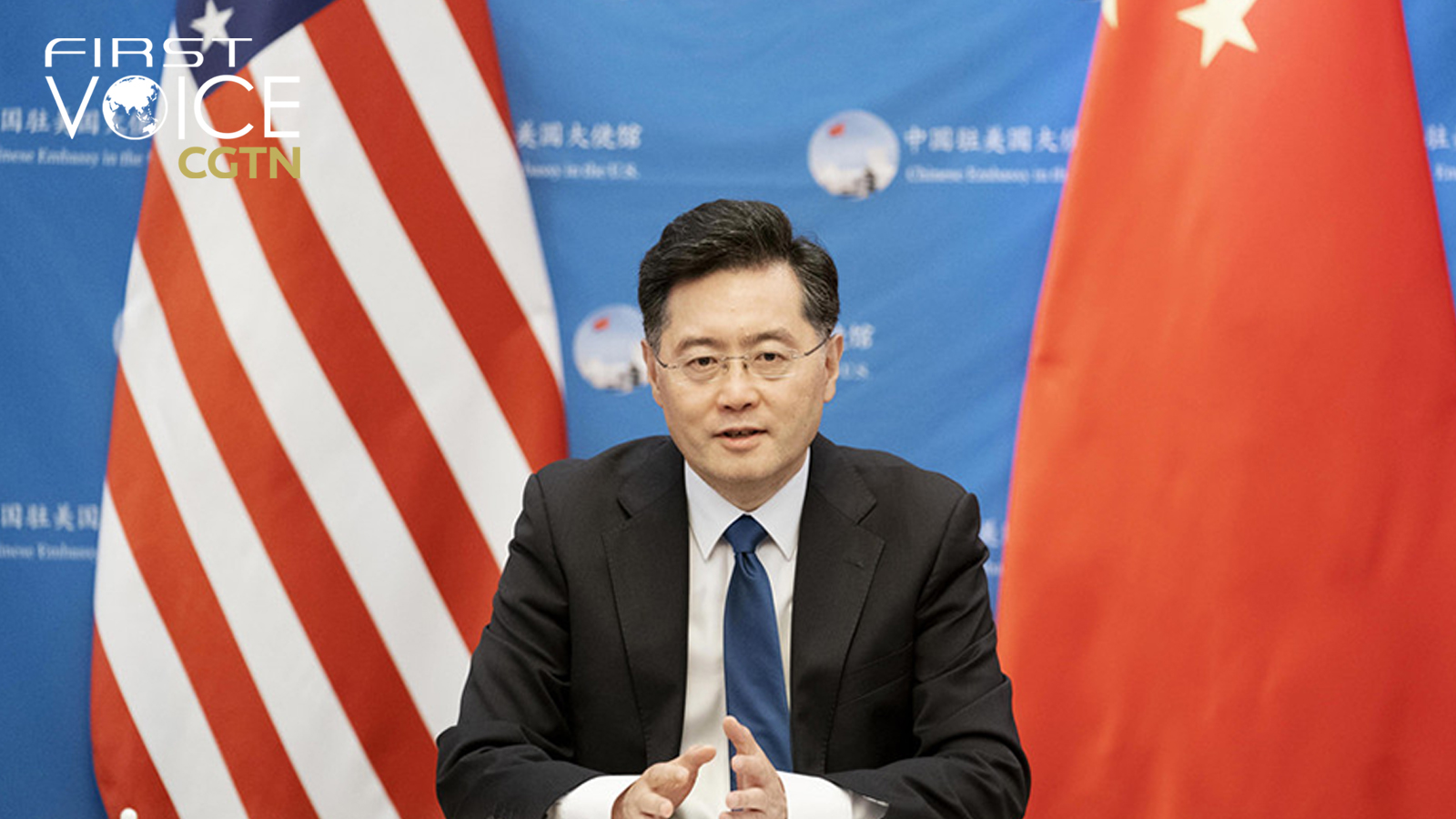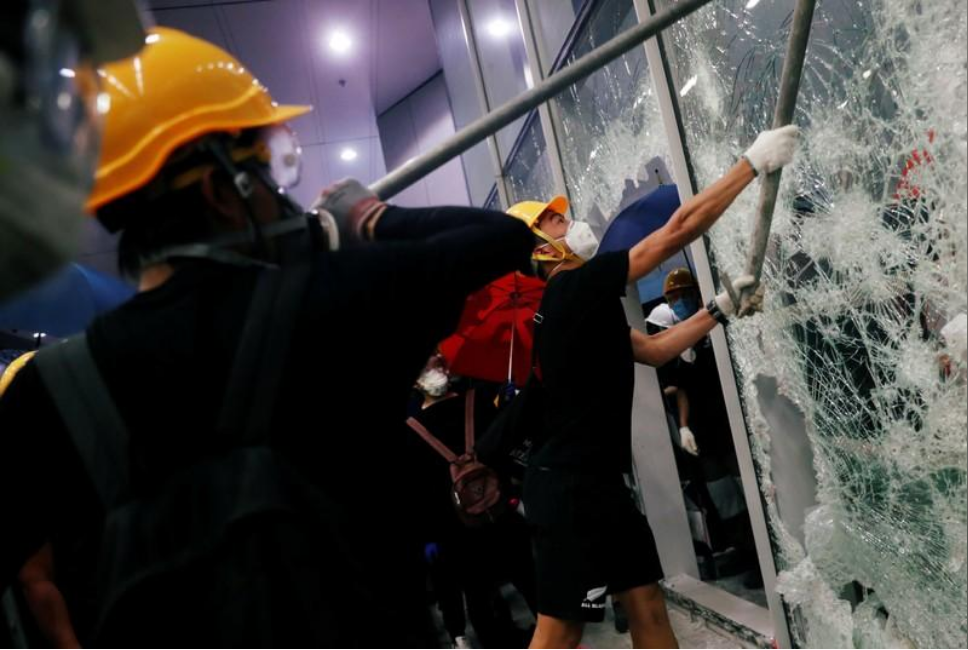
Chinese Ambassador to the U.S. Qin Gang delivered a keynote speech at the welcome event by the National Committee on U.S.-China Relations Board of Directors, August 31, 2021. /Official website of China's Ministry of Foreign Affairs.
Chinese Ambassador to the U.S. Qin Gang delivered a keynote speech at the welcome event by the National Committee on U.S.-China Relations Board of Directors, August 31, 2021. /Official website of China's Ministry of Foreign Affairs.
Editor's note: CGTN's First Voice provides instant commentary on breaking stories. The daily column clarifies emerging issues and better defines the news agenda, offering a Chinese perspective on the latest global events.
Qin Gang's address as the new Chinese ambassador to the U.S. – a reminder that Washington is dangerously misreading the situation with Beijing – has been mocked as "going full wolf" by a major U.S. political media outlet, another ominous sign for U.S.-China relations for Washington.
In recent years, Chinese diplomats have been taking an increasingly assertive and vocal posture, showing their frustration at U.S. attempts to diminish and isolate Beijing on multiple fronts.
The Trump administration launched a trade war against China in a flagrant breach of WTO rules. It attempted to "decouple" the two economies without any basis in U.S. law. It used state power to undermine competitive, law-abiding Chinese corporations. It supported a violent separatist movement in Hong Kong. It spread toxic disinformation, including that COVID-19 was leaked from a Chinese lab and there is ongoing genocide in Xinjiang.
The Biden administration has doubled down on these provocative policies.
Western pundits have written tens of thousands of words analyzing what might be behind the increasingly forceful language used by Beijing – dubbed "Wolf Warrior" diplomacy after a popular patriotic Chinese action movie.
The answer to this question is not a mystery and not very complex.
Wolves growl and snarl when they are threatened. The increasingly strident protests from Chinese diplomats are warnings that China will forcefully defend itself if its territorial integrity is violated.
Despite an unbroken string of military debacles over the decades dating back to the DPRK and Vietnam, the U.S. still believes that it can resolve international disputes with military power.
Utter and complete failures in Afghanistan, Syria and Iraq have not shaken U.S. confidence in the might of its navies to project power anywhere in the world.
This unfounded hubris risks leading the world to disaster.
One important basis of diplomatic relations between China and other countries is their acceptance of the one-China principle. Most nations – 180 out of the 193 UN member states and global institutions including the UN itself – have accepted this principle.
Currently, the Biden administration is leading a charge for nations to go back on this pledge in order to isolate and slow the inevitable rise of China.
The U.S. and Japan are unabashedly forging "diplomatic" ties with Taiwan separatists and hinting at – although notably not promising – military support. The European Union seems intent to follow in these footsteps.
China has been clear and consistent: Taiwan independence means war.

Rioters break into the Legislative Council building during the anniversary of Hong Kong's return to China, Hong Kong, China, July 1, 2019. /Reuters
Rioters break into the Legislative Council building during the anniversary of Hong Kong's return to China, Hong Kong, China, July 1, 2019. /Reuters
Consider the current situation in Xinjiang. Violent separatist terrorists launched a deadly campaign in the northwest China region for years. Deadly terror attacks then started occurring in other parts of China.
This is exactly the kind of violence the U.S. "War on Terror" aimed to combat.
But has the U.S. supported China's efforts to root out radicalism? On the contrary, the U.S. has run a disinformation campaign alleging a Chinese "genocide" in Xinjiang. Against this backdrop, a so-called conference has even been held to discuss the "genocide."
The only proof the U.S. and its allies have presented for this grave charge has been a handful of "witnesses" provided by a separatist group claiming Xinjiang is "rightfully an independent East Turkestan," and a series of papers by a fundamentalist Christian evangelist that equates family planning policies with mass murder.
This shameless disinformation campaign is matched by continued baseless claims that COVID-19 leaked from a lab – an assertion without a single piece of concrete evidence. The lab leak theory has been dismissed by the WHO as well as top scientists, their articles appearing in prestigious journals like Science and Cell. And the American intelligence community, striving to find solid evidence to convict China of leaking the virus, concluded they don't know how SARS-CoV-2 developed after their 90-day labor.
In his address as ambassador to the U.S., Qin Gang urged Washington and Beijing to be clear about each other's bottom lines and show mutual respect, emphasizing that the two sides should remove disturbances in their relationship and focus on cooperation.
After all, the world is facing a global health crisis, and the danger of climate change is becoming more obvious each day as extreme weather events multiply around the world. Even now, record-breaking rainfall from the remnants of Hurricane Ida is thrashing New York City and has already resulted in deaths.
The U.S. would be making a strategic error of historic dimensions if it chooses to ignore China's calls for dialogue and cooperation and its warnings about crossing China's bottom line – using the condescending and ignorant label "Wolf Warrior" diplomacy.
Can you imagine how the U.S. would respond if a country armed and encouraged separatists in several parts of its territory, launched a series of brazen disinformation campaigns supported at the highest levels, and tried to form an international coalition to choke its economy and isolate it diplomatically?
Judging from its wars in Afghanistan and Iraq, the answer is obvious. The U.S. would respond more forcefully than any other country facing such an onslaught. But first, it would growl.
(If you want to contribute and have specific expertise, please contact us at opinions@cgtn.com.)

